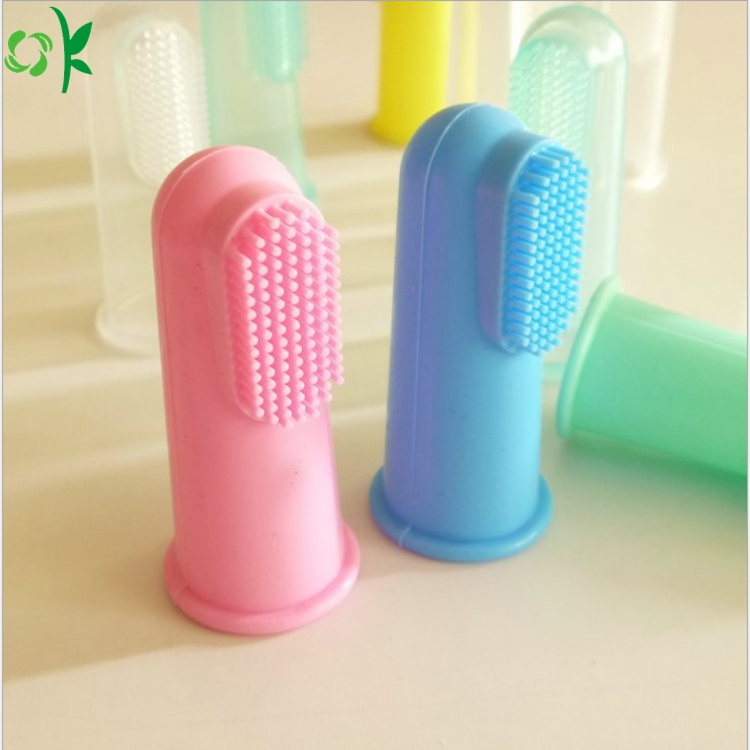About Baby toothbrush:
Food-grade baby Silicone Toothbrush,which can safely bited by your baby. The soft brush head is a gentle and responsible small cleaner that sweeps away the dirt left in the baby's mouth. Clean your baby's gums. The back of the design with a embossment is like a masseur, gently massage the baby's gums to protect the baby's gums. This kind of different experience not only makes the mothers love it, but also allows the baby to enjoy brushing their teeth.
The protector of the baby's oral health. Remove all the troubles and worries of the mothers.
Product introduction:
1.Product name:Silicone baby toothbrush,Silicone baby finger toothbrush,Silicone finger toothbrush,Baby toothbrush,Baby teething toothbrush,baby banana infant training toothbrush and teether
2.Place of origin:Guangdong China
Silicone Toothbrush Silicone Toothbrush,Silicone Baby Toothbrush,Silicone Baby Finger Toothbrush,Silicone Finger Toothbrush,Baby Toothbrush,Baby Teething Toothbrush,Baby Banana Infant Training Toothbrush And Teether Dongguan OK Silicone Gift Co., Ltd. , https://www.dgsiliconepettags.com
The China Pesticide Industry Association believes that methamidophos currently on the market is a small amount of stocks produced in 2006 and is not produced by retained export companies after January 1, 2007. From January 1, 2007, China completely stopped the use of highly toxic pesticides such as methamidophos in the country, and retained only part of its capacity for agricultural emergency needs and exports. At present, this program has not yet been in operation for a year. The related production enterprises no longer sell banned pesticides to the domestic market from January 1. However, there are still a small amount of methylamine that has not been sold or applied in the circulation and the farmers' production in the previous year. Phosphorus pesticides, which are not reserved for export companies.
The China Pesticide Industry Association also believes that methamidophos is not a major factor affecting the quality and safety of agricultural products. Due to the easiness of decomposition of methamidophos, few residues are detected in agricultural products if applied normally. The main problem with methamidophos is its acute toxicity and acute poisoning caused by its use in vegetables, and it is safe to apply it to crops such as wheat, cotton, rice, and corn. Because methamidophos residues in crops are low, they are still being applied in more than 70 countries and regions, including the developed United States, Europe, and underdeveloped India and South America. Due to the lack of knowledge about farmers' drug use in China, and the lack of popularization and guidance of knowledge about scientific drug use, in order to avoid more poisoning accidents, they have had to stop their use. However, if it stops its production and exports, it will inevitably be biased and it will be unfair to the legitimate companies that abide by the rules and regulations. The international concern for food safety concerns the residual limits of all agrochemical products applied to crops. Therefore, the China Pesticide Industry Association emphasizes that in this situation, if only the production process is strengthened, and the management of circulation and application is neglected or weakened, even pesticides with low toxicity and safety will inevitably suffer problems.
In view of this, the China Pesticide Industry Association puts forward the following recommendations: First, strengthen market supervision and guidance for farmers' scientific use of drugs. For the circulation field and the small amount of pesticides such as methamidophos in the hands of farmers, the relevant regulatory agencies should increase their efforts to clear the funds. For example, adopting low-toxicity pesticides in exchange for highly toxic pesticides in the hands of farmers, the highly toxic pesticides collected should be funded by the state. Environmental harmless methods have been adopted for the treatment; for typical cases still being illegally produced, sold or used, the public security and judicial departments intervened to increase penalties and create deterrence. Secondly, the retention of the production and export of a few key enterprises is not only beneficial to the structural adjustment of enterprises' products and meets the needs of the international market, but also can be used for the emergency of major domestic disasters. It is relying on dichlorvos and other organophosphorus pesticides to play a preventive and therapeutic role. In order to facilitate supervision, the list of production exporters can be reduced and clearly retained. The number of enterprises has been reduced from the current 16 companies to 5-6.
Are mothers still worried about your baby's oral health? Is it troubled by the fear that the toothbrush is not soft enough to cause damage to the baby's gums? Are you still worried about your baby eating a brush?
Is there any way to protect your baby's oral health without damaging gums?
3.Color:any pantone color
4.Logo:printing,debossed,embossed
5.MOQ:500pcs.
6.Package:1 pcs/opp,customized design is available.
7.Design:Customized/stock
8.Certification:FDA,LFGB,SGS,ROHS,etc.
9.Usage:Clean mouth
10.Silicone baby toothbrush photos for reference.

Pesticide Association writes "Keeping a knife under the company"
The press conference recently held by the Information Office of the State Council sent news that, in order to eliminate the negative effects of five highly toxic organophosphorus pesticides such as methamidophos on agricultural products, the State Council has decided to shut down 16 designated high-toxic pesticide production enterprises. According to related company's request, on November 5, the China Pesticide Industry Association wrote a letter to the State Council and called on the country to formulate measures to partially retain production equipment and export of high-toxic pesticides such as methamidophos.